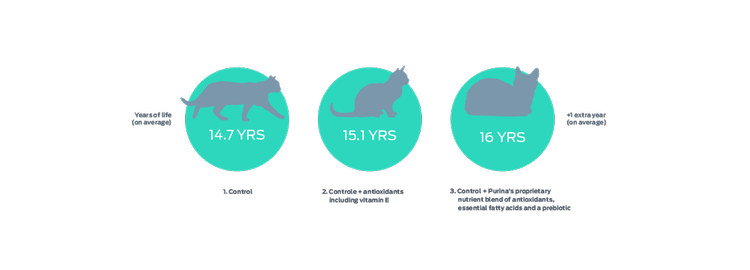
Dietary interventions in cats have long played a role in managing specific clinical problems, such as diabetes or renal disease. However, nutrition can also play a positive role in addressing changes in health, such as the cumulative effects of oxidative stress, that arise from simply living a long time.
While there are many factors that affect the rate an individual ages, studies by Purina scientists show that the combined effects of a nutrient blend that includes antioxidants, essential fatty acids and a prebiotic, can help older cats have healthier, longer lives.1
Purina's research

In this long-term feeding study, 90 healthy mixed-breed cats entered the study between 7 and 17 years of age, and continued in the study for the remainder of their life.
The cats were divided into three groups, each fed different diets:
- Control
- Control + antioxidants including vitamin E
- Control + Purina’s proprietary blend of antioxidants, essential fatty acids and prebiotic
Purina’s blend of nutrients was scientifically proven to increase life span by an average of one year.1

This pioneering study also showed improvements in multiple health parameters in older cats

Increased skin fold thickness, a marker of improved nutritional status
Adapted from Cupp et al., 2008

Improved preservation of body weight
Adapted from Cupp & Kerr, 2010

Maintenance of a healthier gut microflora balance
Adapted from Cupp & Kerr, 2006

Improved Vitamin E levels
Adapted from Cupp & Kerr, 2010
Key things to remember
- Nutrition can play a key role in extending the healthy life of cats.
- A 9-year study showed that a nutrient blend, with antioxidants, essential fatty acids and a prebiotic can extend the healthy lives of cats.
- Cats fed a proprietary nutrient blend better maintained body weight, lean body mass and had slower age-related decreases in several health measures.
Explore how nutrition can help pets lead better, longer lives:
Find out more
1. Cupp, C. J., Kerr, W.W., Jean-Philippe, C., Patil, A. R., & Perez-Camargo, G. (2008). The role of nutritional interventions in the longevity and maintenance of long-term health in aging cats. International Journal of Applied Research in Veterinary Medicine, 6(2), 69-81.
2. Cupp, C. J., & Kerr, W. W. (2010). Effect of diet and body composition on life span in aging cats. Nestlé Purina Companion Animal Nutrition Summit, Florida, USA, 36-42.
3. Cupp, C. J., Jean-Philippe, C., & Kerr, W. W. (2006). Effect of Nutritional Interventions on Longevity of Senior Cats. International Journal of Applied Research in Veterinary Medicine, 4(1), 34-50.


